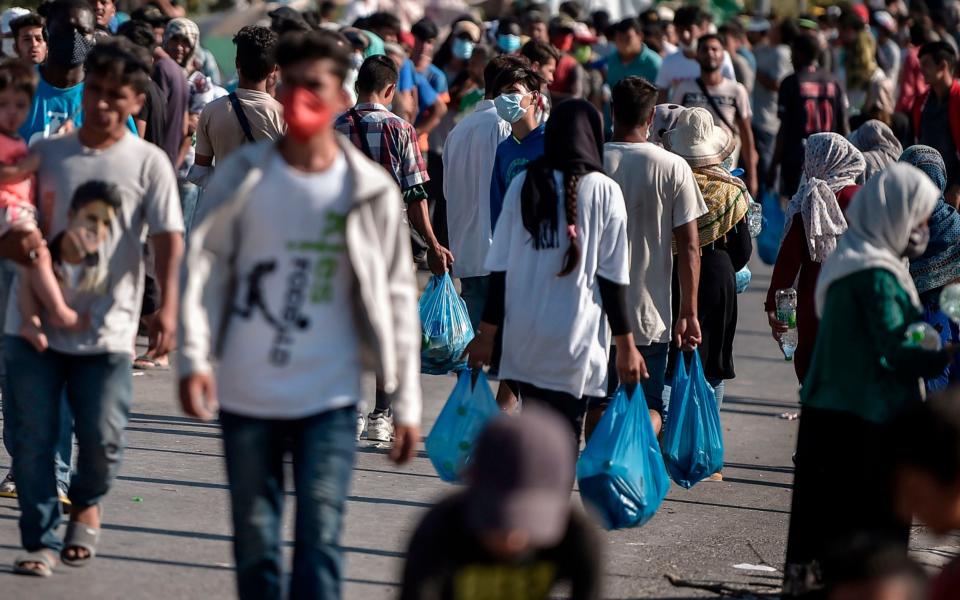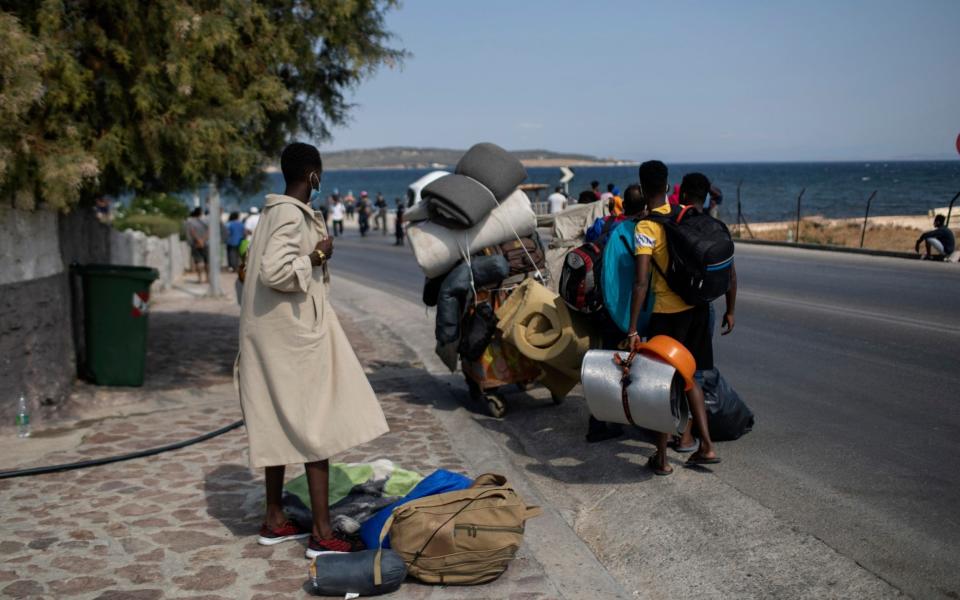Migrants on Greek island revolt over plans to send them to new 'prison' camp

“We will stay here until the riot police take us by force,” vowed Afghan refugee Abdulbasir Qarizada, his face covered by a black surgical mask. One of thousands left homeless after last weeks' fire that destroyed a migrant camp on the Greek island of Lesbos, he and others have been sleeping rough ever since.
For the last six days, their home has been a sun-scorched stretch of tarmac outside the town of Moria, where the camp now lies in ruins. But it was not the mid-summer heat or the lack of basic facilities that worried Mr Qarizada: instead, it was the prospect of relocation to Kara Tepe, a new camp being built on a military firing range.
“We stayed in the Moria hell for one year, when we enter the new camp we don’t know when we’ll come back out,” he told The Telegraph, as behind him bulldozers levelled the beach for the new camp.
Since it was built in 2015, the camp at Moria has been an undignified symbol of Europe’s migrant policies. What had become the continent's large refugee facility was notoriously crowded and squalid, with limited access to food, sanitation and health care.
However, with Moria now gone, the refugees fear they will now be herded into a new facility that will be even worse. Once construction is finished, Kara Tepe is expected to hold more than 12,000 homeless refugees and migrants.
This looks unlikely to happen overnight, given the hastiness of the construction so far.
“I can’t predict when the camp will be ready. It will be a constant frontier, constant work, twenty-four-seven,” said Stephan Oberriet, Doctors Without Borders’ Head of Mission in Greece. Mr Oberriet pointed out early flaws in the camp layout, including the narrow spacing between tents. “You need an access road wide enough for traffic, and they haven’t done that.”

Nonetheless, by Monday, some 600 people - mostly families - had already found new shelter inside new facility. “This camp will give a dignified life…it will give a sense of safety to the refugees but also for the locals,” a spokesperson for the Ministry of Migration and Asylum told The Telegraph.
The blaze at Moria comes after a gradual deterioration in relations between local residents and refugees, with some former Moria camp residents blaming far-right factions for the blaze that tore down the camp.
Dagaris Giorgios, a resident of Moria town, said some of the refugees had abused the hospitality that was initially extended to them. “When they came here, we hosted and provided for them, but they destroyed everything.”
Tensions were not always high between the host community and refugees, according to Dimitris Tsouxlis, of Greek non-profit group Refugee Support Aegean.

“In 2015, everyone saw [Lesbos] as an example of refugee support, from volunteers to the European society. But now they are not there,” he said. The prolonged stay of thousands of asylum seekers, he said, had fuelled xenophobic attacks.
On Monday, a leaflet distributed by the Ministry of Migration and Asylum welcomed residents to the new camp, and warned them that their asylum requests would not be processed unless they agreed to remain within there. But government reassurances have done little to soothe the refugees’ worries.
Many are desperate to leave Lesbos, which rights groups have referred to as an overcrowded “open-air prison”. “I’ve heard the situation in the camp is even worse, I will try in every way to stay out,” said 31-year-old Mohammad Ibrahimi from Afghanistan.
According to some refugees, a handful of new residents in Kara Tepe have already escaped, by swimming from the camp’s shore to a nearby beach. Over the weekend, Greek police fired teargas to disperse refugees who had gathered to protest against being moved into Kara Tepe.
But despite thousands taking part in the demonstrations, others appeared to have accepted that the battle was lost. “If it is by force then we have no choice,” said 46-year-old Nurhalim Zakhel. Next to him, Resa Madadi stared off into the distance: “We are ready to be deported to Afghanistan," he said. "We know it’ll be dangerous, but it’s better than prison.”

 Yahoo News
Yahoo News 
